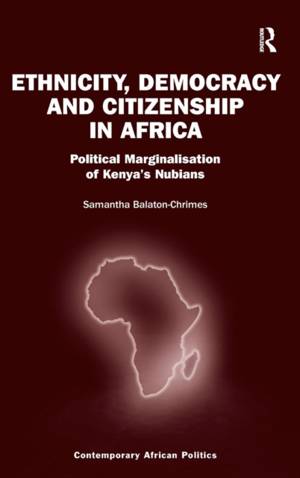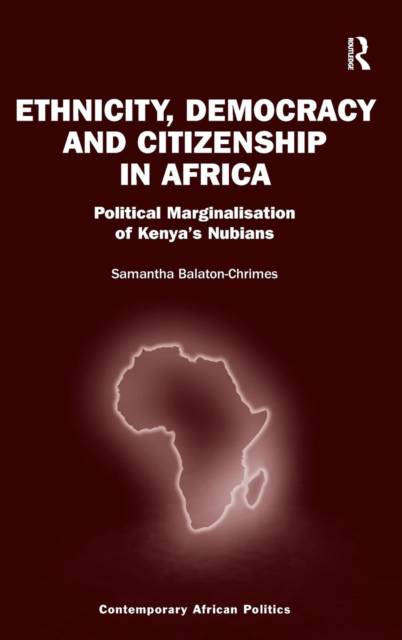
- Afhalen na 1 uur in een winkel met voorraad
- Gratis thuislevering in België vanaf € 30
- Ruim aanbod met 7 miljoen producten
- Afhalen na 1 uur in een winkel met voorraad
- Gratis thuislevering in België vanaf € 30
- Ruim aanbod met 7 miljoen producten
Zoeken
Ethnicity, Democracy and Citizenship in Africa
Political Marginalisation of Kenya's Nubians
Samantha Balaton-Chrimes
€ 290,45
+ 580 punten
Uitvoering
Omschrijving
As an ethnic minority the Nubians of Kenya are struggling for equal citizenship by asserting themselves as indigenous and autochthonous to Kibera, one of Nairobi's most notorious slums. Having settled there after being brought by the British colonial authorities from Sudan as soldiers, this appears a peculiar claim to make. It is a claim that illuminates the hierarchical nature of Kenya's ethnicised citizenship regime and the multi-faceted nature of citizenship itself. This book explores two kinds of citizenship deficits; those experienced by the Nubians in Kenya and, more centrally, those which represent the limits of citizenship theories. The author argues for an understanding of citizenship as made up of multiple component parts: status, rights and membership, which are often disaggregated through time, across geographic spaces and amongst different people. This departure from a unitary language of citizenship allows a novel analysis of the central role of ethnicity in the recognition of political membership and distribution of political goods in Kenya. Such an analysis generates important insights into the risks and possibilities of a relationship between ethnicity and democracy that is of broad, global relevance.
Specificaties
Betrokkenen
- Auteur(s):
- Uitgeverij:
Inhoud
- Aantal bladzijden:
- 202
- Taal:
- Engels
- Reeks:
Eigenschappen
- Productcode (EAN):
- 9781472440662
- Verschijningsdatum:
- 28/02/2015
- Uitvoering:
- Hardcover
- Formaat:
- Genaaid
- Afmetingen:
- 156 mm x 234 mm
- Gewicht:
- 462 g

Alleen bij Standaard Boekhandel
+ 580 punten op je klantenkaart van Standaard Boekhandel
Beoordelingen
We publiceren alleen reviews die voldoen aan de voorwaarden voor reviews. Bekijk onze voorwaarden voor reviews.











